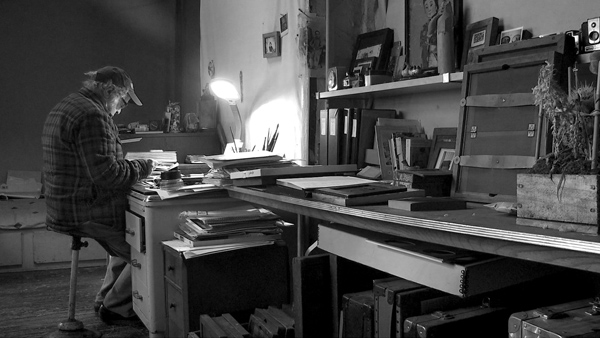World premiering at the New York Film Festival, Don’t Blink – Robert Frank, the documentary of the life and work of artist Robert Frank, starts off with a wallop of energy. You are transported to the heyday of New York City subversive culture as edgy but upbeat punk rock fills your ears while images of Manhattan, back when it was a playground for radical artists rather than for the wealthy, fill the screen. You’re introduced to photographer and filmmaker Robert Frank, whose coterie included Jack Kerouac, William Burroughs, Allen Ginsberg, and others at the height of the Beat era.
Frank, now 90 years old, is still full of life with a confrontational attitude. His acerbic perspective is a hoot at first, but as the film goes on, you realize that the vast majority of it is going to be Frank talking about himself, and the film loses its initial kick-ass energy. The music, however, remains flawlessly chosen, exuberant and inspiring, balancing out the fogginess of a nonagenarian’s pontifications with punk rock energy. Despite its unevenness, Don’t Blink is a worthwhile project honoring and documenting the unique life of an influential visual artist.
Frank shot to prominence in 1959 with the publication of a book of photography called The Americans, featuring a foreword by Kerouac. Isn’t it amazing that a book of photography used to be grounds for fame and success? Coming from Switzerland to America, Frank captured the underbelly of American life during an era when American pride was at an all-time high. While the mainstream of America saw wholesome family values, a strong military that saved the world from fascism, and a robust economy, Frank saw crass consumerism, racism, and capitalism run amok.
It quickly becomes clear that the rest of Frank’s career would be a downward slope, as he became less interested in photography and more interested in filmmaking. Unfortunately, he is not as good a filmmaker as he is a photographer. The bulk of Don’t Blink, aside from grumpy remarks from Frank, consists of clips from his many, many short films from the last several decades. Nowadays with smartphones, everyone records their every activity—but Frank was as compulsive about recording daily minutia ages ago as we are today. His approach to film was treating it as an extension of photography, assembling series of images that move and come to life, rather than still photographs. He isn’t interested in sound design, tone, pacing, or story.
Part of the problem with being an antagonistically brilliant artist is that you remain a mystery to your peers. So when it’s time to make a documentary, you end up doing all the talking yourself. There are some clips of others discussing Frank, though not many, and there’s no narration. This project is really an occasion to share Frank’s obsessively vast collection of short films to a wider audience.
Some of them are interesting enough, though they all tend to blend together. There is an admirable experimental quality to all of them. “One Hour” consists of an attempt to shoot footage on the New York City streets nonstop for one hour, just to see what happens. Some familiar faces pop up in these shorts, like a very young, cool-looking Tom Noonan and Jim Jarmusch’s brother, Tom.
There’s a fascinating bit on the making of Frank’s never released film, Cocksucker Blues, chronicling the Rolling Stones during their 1972 American tour at the height of their debauchery. Mick Jagger allegedly told Frank he made a great film, but that if it was ever released, the band would never be allowed back in the country. Though the band never hid their hedonistic lifestyle, apparently the content of the film was so extreme that even the Rolling Stones had to insist it not be released. We also get some insight into the making of Frank’s most ambitious feature film project, 1988’s little seen but critically praised Candy Mountain. The film is as close to a mission statement as Frank has given: an earnest young musician resists the temptations of commercialism, vowing to make art only for pure intentions. Frank was exhausted by the effort, as making a real movie requires a huge amount of planning and attention to details, and that didn’t really suit him.
These stretches where Frank’s life and work intersect with popular culture become increasingly few and far between as he retreats back to his quiet life making videos for his own pleasure. He spends his time with his wife, June, in their artist workshop, where she is constantly power-sawing wood or blowtorching metal for a new project, and Robert is working on mixed-media visual art. They’re the original Bushwick hipsters.
There’s an interesting video clip of Frank giving a talk at New York University in probably the mid-1980s or so. One student, a fan of Frank’s photography, rather antagonistically asks Frank why his films are so disorienting, jarring, and seemingly carelessly made. What is the intended effect, he is asked? Frank bellows in response, “I have no philosophy!” He wasn’t joking. He just makes things and doesn’t think too much about the larger meaning. For Frank, it’s better to be making things than not making things, and the time you spend thinking about what to make, or why you’re making what you’re making, could be better spent just making.
Frank is a contradiction, both a pioneering avant-garde artist and totally unpretentious about any higher meaning of art. Even now, he’s hard at work making things, and Don’t Blink is an invitation to watch him at work. The result might not always be all that meaningful, but the work ethic is.

















Leave A Comment